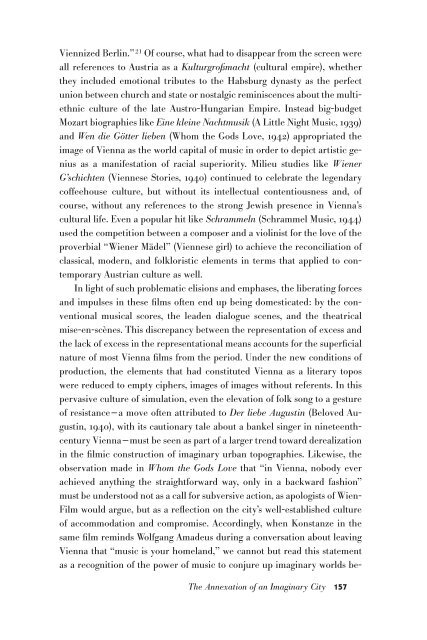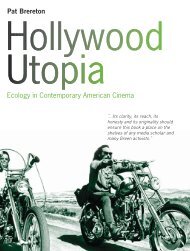You also want an ePaper? Increase the reach of your titles
YUMPU automatically turns print PDFs into web optimized ePapers that Google loves.
Viennized Berlin.” 21 Of course, what had to disappear from the screen were<br />
all references to Austria as a Kulturgroßmacht (cultural empire), whether<br />
they included emotional tributes to the Habsburg dynasty as the perfect<br />
union between church and state or nostalgic reminiscences about the multiethnic<br />
culture of the late Austro-Hungarian Empire. Instead big-budget<br />
Mozart biographies like Eine kleine Nachtmusik (A Little Night Music, 1939)<br />
and Wen die Götter lieben (Whom the Gods Love, 1942) appropriated the<br />
image of Vienna as the world capital of music in order to depict artistic genius<br />
as a manifestation of racial superiority. Milieu studies like Wiener<br />
G’schichten (Viennese Stories, 1940) continued to celebrate the legendary<br />
coffeehouse culture, but without its intellectual contentiousness and, of<br />
course, without any references to the strong Jewish presence in Vienna’s<br />
cultural life. Even a popular hit like Schrammeln (Schrammel Music, 1944)<br />
used the competition between a composer and a violinist for the love of the<br />
proverbial “Wiener Mädel” (Viennese girl) to achieve the reconciliation of<br />
classical, modern, and folkloristic elements in terms that applied to contemporary<br />
Austrian culture as well.<br />
In light of such problematic elisions and emphases, the liberating forces<br />
and impulses in these films often end up being domesticated: by the conventional<br />
musical scores, the leaden dialogue scenes, and the theatrical<br />
mise-en-scènes. This discrepancy between the representation of excess and<br />
the lack of excess in the representational means accounts for the superficial<br />
nature of most Vienna films from the period. Under the new conditions of<br />
production, the elements that had constituted Vienna as a literary topos<br />
were reduced to empty ciphers, images of images without referents. In this<br />
pervasive culture of simulation, even the elevation of folk song to a gesture<br />
of resistance—a move often attributed to Der liebe Augustin (Beloved Augustin,<br />
1940), with its cautionary tale about a bankel singer in nineteenthcentury<br />
Vienna—must be seen as part of a larger trend toward derealization<br />
in the filmic construction of imaginary urban topographies. Likewise, the<br />
observation made in Whom the Gods Love that “in Vienna, nobody ever<br />
achieved anything the straightforward way, only in a backward fashion”<br />
must be understood not as a call for subversive action, as apologists of Wien-<br />
Film would argue, but as a reflection on the city’s well-established culture<br />
of accommodation and compromise. Accordingly, when Konstanze in the<br />
same film reminds Wolfgang Amadeus during a conversation about leaving<br />
Vienna that “music is your homeland,” we cannot but read this statement<br />
as a recognition of the power of music to conjure up imaginary worlds be-<br />
The Annexation of an Imaginary City 157

















